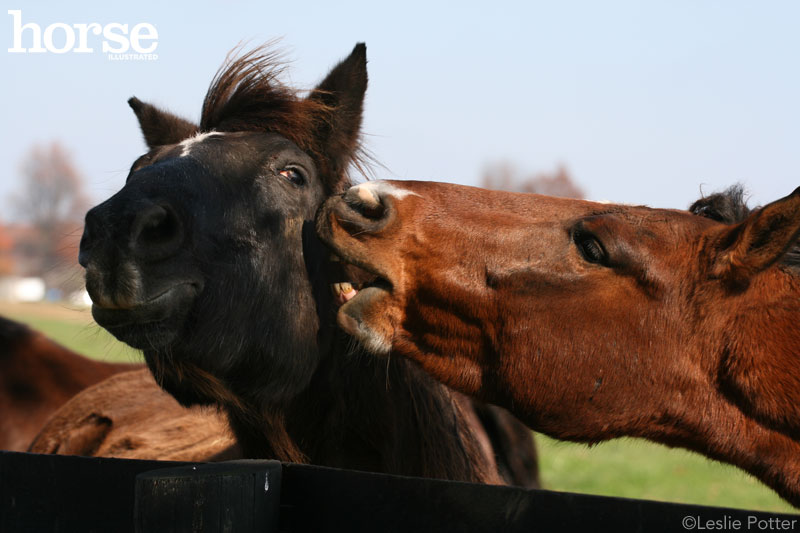
Horses display playful behaviors with other horses. For the safety of human handlers, it’s important to make sure these behaviors don’t occur during horse/human interactions.
Trainer Jill Girardi-Thomas is convinced that her Arabian gelding has a sense of humor.
When it comes to animal antics every horse owner has at least one tale to tell. And though people tend to overly humanize their horse’s actions, equine behavior experts say that horses often do exhibit actions that humans characterize as funny. Horses come by some of those behaviors naturally. Others they learn by interacting with their human handlers. Either way, owners should remember that the way they respond to their horse’s high jinks is no laughing matter.
According to Dr. Sarah Ralston, VMD, PhD, DACVN, Professor and Fullbright Scholar in the Animal Science Department of Rutgers University, horses display so-called “playful” behaviors among one another all their lives. Young males snort, nip and pin their ears, engage in mock fights and “play tag” to practice the social and physical skills they’d need to access the herd’s mares and to generally survive in the wild. Meanwhile, mares display their feral instincts by running to incite mock stampedes and bucking imaginary predators off their backs.
“In my experience geldings tend to be ‘funnier’ and mares tend to be more ‘businesslike,’” Ralston says.
When horses interact with humans, they demand attention by nipping at handlers, pawing the ground or kicking at stall walls, Ralston says. Owners often reinforce those behaviors with treats and other food rewards. But when someone fails to respond quickly enough or in a way that the horse expects, a the same behavior can become problematic or even dangerous, Ralston warns.
“There is really a fine line that is often hard to discern between a cute or funny action that just makes us laugh versus creating a monster by rewarding the same behavior,” Ralston says.
That’s why it is critical for owners to decide which equine behaviors they are willing to tolerate and which they absolutely will not allow, says trainer Clarissa Cupolo.
Here’s how she advises them to do it:
Start early
Generally, owners tend to be more tolerant of a range of behaviors when their horses are young. But some of those actions quickly change from cute to dangerous.
”Some owners treat their young horses the same way they treat the family dog: they run with them, chase them, even wrestle with them,” Cupolo says. “But there’s nothing cute about that behavior when the horse is big enough to push you around.”
Get over it
When Ringo wants attention from his owner, he gently wiggles his lips on her shoulder. If she fails to focus her attention entirely on him, the gelding takes a nip.
“And that’s not cute at all,” Cupolo says. “So the remedy is for the owner to to get over the cuteness and show Ringo that nipping is not the way to get attention.”
Wear your game face
Within the herd, horses generally rely on body language to discourage unacceptable behavior and keep one another in check. Cupolo advises owners to do the same.
“For example, if you have a horse that wants to pick gloves, or combs or crops out of your back pocket, you want him to know that the behavior is not cute or acceptable,” Cupolo says. “Make the point by giving him a stern look and by making yourself look as big as possible.”
If a forbidding look is not enough, Cupolo suggests tying a small plastic bag around the end of a long dressage whip and waiving in front of the horse.
“The point is to scare him, not to inflict pain,” she says.
Be consistent
Whatever an owner does to discourage unwanted or mischievous equine behavior, Cupolo reminds them to be consistent.
“You can’t think a certain behavior is cute or humorous one and inappropriate the next,” she says. “If you do the horse will take advantage.
Be patient
Like their human counterparts, horses are not likely to change their behavior overnight. Owners can increase the odds by devoting a day to work on behavioral issues and nothing else.
“Give yourself and your horse time to focus,” Cupolo says.
Don’t get discouraged
“Horses are very smart and every horse is going test you from time to time,” Cupolo says. “Aggressive horses tend to test their owners, less aggressive ones may need to be reminded just once.”
Get help if you need it
Owners who are unsure that their methods are effective, should turn to a trainer for help. Just be sure to choose a trainer that has as a proven track record of humanely solving equine behavioral issues.
“A trainer might be fabulous at working with a rider, but not be as effective at working exclusively with the horse,” Cupolo says. “Make sure you get the trainer that has experience with the horse.”

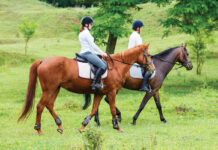
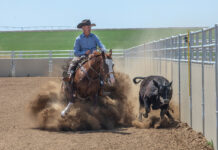
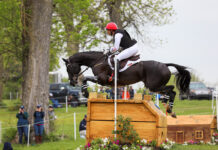

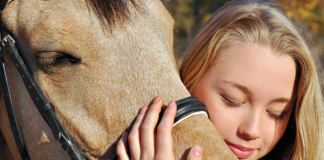
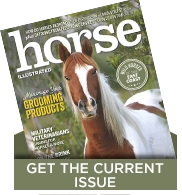
great info